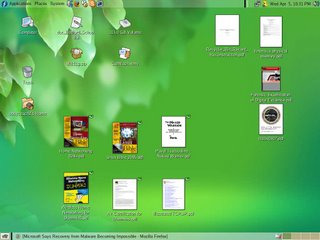
My Current Fedora Core 5 Linux Desktop
On January 24, I wrote an overview of how to recover from malware infestation (viruses, spyware, adware). Seems I was right:
On ZDnet.com, the article, "Wiping an infected computer is best for any OS" agrees with me. Maybe I'm a bit ahead of my time. Also on ZDnet.com, "Microsoft says Recovery from Malware becoming Impossible." Even the MS people are beginning to agree, especially for business.
Microsoft is losing it's 'Trusted Computing" marketing campain, and that really does suck. I like Windows. It's easy, and it works. I know some will disagree with me on this, but Windows is slightly easier than Mac. Just slightly. Microsoft has a hugh customer base to help them determine HOW to make Windows easier. Mac has the Mac Cult people telling them how to make it easier. Not the best population for new user information. With Windows, plug damn near anything into it, and it works! Not so with Mac, and especially not so with Linux. Most things will work with Mac, but printers are bitchy. Many things will work with Linux, especially older hardware, but newer things -like wireless devices- are complicated to get working. Not for the impatient. Windows Plug'n Play works.
As it turns out, that might not be a good thing.
Apple did a good thing switching to a BSD (Berkley Software Distribution) of Unix as their base kernel. It makes the system much more stable, reliable, less prone to crashes, and much less prone to viruses, spyware, and adware (all now referred to as 'malware'). But, it still has holes. Very small holes, and extremely difficult to get through. The BSD version they use is a wee bit old. They do put security updates out quickly. Good for Apple.
But, keep this in mind: Both Apple and Microsoft have a limited amount of engineers, programmers, coders, and other various geeks working on the Operating Systems. Linux has thousands, and growing everyday. Because Linux is Open Source, it has more people working to fix bugs, patch holes, and make it more secure. Linux communities find thousand of bugs and holes in the same amout of time Windows finds only 50 or so. The hackers find the rest on Windows.
Another article on ZDnet.com, "Open Source gets Results, While Microsoft Blames Malware on Stupid Users," also explains why Open Source works. Personally, I think the author is a bit biased, but the point is still made, and the facts are correct. I don't seriously think Microsoft says "Stupid Users". They designed their system for the novice and new user. But, more and more engineers are independently helping Linux development, and for FREE. Most don't get paid squat. Companies that make money from Linux do so by supporting the software, not creating it. Red Hat no longer makes it's software. It created the Fedora Community for that. And Mark Shuttleworth's foundation gives Ubuntu away for FREE. Even will ship it for free.
Another article on ZDnet.com, "Open Source gets Results, While Microsoft Blames Malware on Stupid Users," also explains why Open Source works. Personally, I think the author is a bit biased, but the point is still made, and the facts are correct. I don't seriously think Microsoft says "Stupid Users". They designed their system for the novice and new user. But, more and more engineers are independently helping Linux development, and for FREE. Most don't get paid squat. Companies that make money from Linux do so by supporting the software, not creating it. Red Hat no longer makes it's software. It created the Fedora Community for that. And Mark Shuttleworth's foundation gives Ubuntu away for FREE. Even will ship it for free.
When I first started using Linux, I cussed, fretted, and fumed trying to get some things to work, and I'm a Power User - a geek wannabe. I've got most things working, just not my Pocket PC connecting to it. As it turn out, that's not a big deal. Eventually, I'll figure it out. I have WAY too many Microsoft Reader ebooks to let go of it completely, or Windows for that matter. And my Laptop? I'm not good enough to attempt Linux on it. Not just yet. When I read that Linux is working easily on most Laptops, THEN I'll try it, but not until then.
As it turns out, Because Linux can be difficult to use is what makes it more secure. I use to bitch about how hard it was to install applications on my Linux Machine. That was before I really understood how to do it through the distributions install methods: Synaptic, apt-get, yum, yumex, rpm,...stuff like that. But, since it is slightly difficult for the user, it makes it really difficult for malware to get installed.
So, to fight Malware, you have a few options:
As it turns out, Because Linux can be difficult to use is what makes it more secure. I use to bitch about how hard it was to install applications on my Linux Machine. That was before I really understood how to do it through the distributions install methods: Synaptic, apt-get, yum, yumex, rpm,...stuff like that. But, since it is slightly difficult for the user, it makes it really difficult for malware to get installed.
Just as easy as it is for you to use Windows, the malware has the same easy time installing itself.
So, to fight Malware, you have a few options:
- Get a Mac- if $$ is an issue, a Mac Mini, even a used one will work fine.
- If you've noticed your computer is getting slower, and defrag doesn't seem to help, follow my original advice; wipe the drive clean, and rebuild the OS and programs.
- If your computer is more than three years old, switch to a Linux distribution - Ubuntu if you're a new user. Easy enough for most newbies, and Freakin FREE.
No comments:
Post a Comment